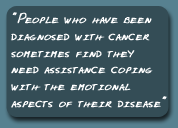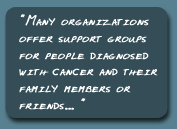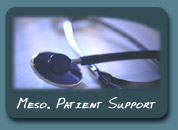|
People diagnosed with cancer and their families face many challenges that
may leave them feeling overwhelmed, afraid, and alone. It can be difficult
to cope with these challenges or to talk to even the most supportive family
members and friends. Often, support groups can help people affected by
cancer feel less alone and can improve their ability to deal with the
uncertainties and challenges that cancer brings. Support groups give people
who are affected by similar diseases an opportunity to meet and discuss
ways to cope with the illness.
How can support groups help?
 People
who have been diagnosed with cancer sometimes find they need assistance
coping with the emotional as well as the practical aspects of their
disease. In fact, attention to the emotional burden of cancer is sometimes
part of a patient's treatment plan. Cancer support groups are designed
to provide a confidential atmosphere where cancer patients or cancer
survivors can discuss the challenges that accompany the illness with
others who may have experienced the same challenges. For example, people
gather to discuss the emotional needs created by cancer, to exchange
information about their disease-including practical problems such as
managing side effects or returning to work after treatment-and to share
their feelings. Support groups have helped thousands of people cope
with these and similar situations. People
who have been diagnosed with cancer sometimes find they need assistance
coping with the emotional as well as the practical aspects of their
disease. In fact, attention to the emotional burden of cancer is sometimes
part of a patient's treatment plan. Cancer support groups are designed
to provide a confidential atmosphere where cancer patients or cancer
survivors can discuss the challenges that accompany the illness with
others who may have experienced the same challenges. For example, people
gather to discuss the emotional needs created by cancer, to exchange
information about their disease-including practical problems such as
managing side effects or returning to work after treatment-and to share
their feelings. Support groups have helped thousands of people cope
with these and similar situations.
Can family members and friends participate in support
groups?
Family and friends are affected when cancer touches someone they love,
and they may need help in dealing with stresses such as family disruptions,
financial worries, and changing roles within relationships. To help
meet these needs, some support groups are designed just for family members
of people diagnosed with cancer; other groups encourage families and
friends to participate along with the cancer patient or cancer survivor.
How can people find support groups?
 Many
organizations offer support groups for people diagnosed with cancer
and their family members or friends. Some of these organizations provide
information on their Web sites about contacting support groups. Many
organizations offer support groups for people diagnosed with cancer
and their family members or friends. Some of these organizations provide
information on their Web sites about contacting support groups.
For
a list, by no means comprehensive, of national non-profit organizations
that may be able to offer services to cancer patients and their families,
click here.
Doctors, nurses, or hospital social workers who work with cancer patients
may also have information about support groups, such as their location,
size, type, and how often they meet. Most hospitals have social services
departments that provide information about cancer support programs.
Additionally, many newspapers carry a special health supplement containing
information about where to find support groups.
What types of support groups are available?
 Several
kinds of support groups are available to meet the individual needs of
people at all stages of cancer treatment, from diagnosis through
follow-up
care. Some groups are general cancer support groups, while more specialized
groups may be for teens or young adults, for family members, or for
people affected by a particular disease. Support groups may be led by
a professional, such as a psychiatrist, psychologist, or social worker,
or by cancer patients or survivors. In addition, support groups can
vary in approach, size, and how often they meet. Many groups are free,
but some require a fee (people can contact their health insurance company
to find out whether their plan will cover the cost). It is important
for people to find an atmosphere that is comfortable and meets their
individual needs. Several
kinds of support groups are available to meet the individual needs of
people at all stages of cancer treatment, from diagnosis through
follow-up
care. Some groups are general cancer support groups, while more specialized
groups may be for teens or young adults, for family members, or for
people affected by a particular disease. Support groups may be led by
a professional, such as a psychiatrist, psychologist, or social worker,
or by cancer patients or survivors. In addition, support groups can
vary in approach, size, and how often they meet. Many groups are free,
but some require a fee (people can contact their health insurance company
to find out whether their plan will cover the cost). It is important
for people to find an atmosphere that is comfortable and meets their
individual needs.
|

 People
who have been diagnosed with cancer sometimes find they need assistance
coping with the emotional as well as the practical aspects of their
disease. In fact, attention to the emotional burden of cancer is sometimes
part of a patient's treatment plan. Cancer support groups are designed
to provide a confidential atmosphere where cancer patients or cancer
survivors can discuss the challenges that accompany the illness with
others who may have experienced the same challenges. For example, people
gather to discuss the emotional needs created by cancer, to exchange
information about their disease-including practical problems such as
managing side effects or returning to work after treatment-and to share
their feelings. Support groups have helped thousands of people cope
with these and similar situations.
People
who have been diagnosed with cancer sometimes find they need assistance
coping with the emotional as well as the practical aspects of their
disease. In fact, attention to the emotional burden of cancer is sometimes
part of a patient's treatment plan. Cancer support groups are designed
to provide a confidential atmosphere where cancer patients or cancer
survivors can discuss the challenges that accompany the illness with
others who may have experienced the same challenges. For example, people
gather to discuss the emotional needs created by cancer, to exchange
information about their disease-including practical problems such as
managing side effects or returning to work after treatment-and to share
their feelings. Support groups have helped thousands of people cope
with these and similar situations.
 Many
organizations offer support groups for people diagnosed with cancer
and their family members or friends. Some of these organizations provide
information on their Web sites about contacting support groups.
Many
organizations offer support groups for people diagnosed with cancer
and their family members or friends. Some of these organizations provide
information on their Web sites about contacting support groups.
 Several
kinds of support groups are available to meet the individual needs of
people at all stages of cancer treatment, from diagnosis through
follow-up
care. Some groups are general cancer support groups, while more specialized
groups may be for teens or young adults, for family members, or for
people affected by a particular disease. Support groups may be led by
a professional, such as a psychiatrist, psychologist, or social worker,
or by cancer patients or survivors. In addition, support groups can
vary in approach, size, and how often they meet. Many groups are free,
but some require a fee (people can contact their health insurance company
to find out whether their plan will cover the cost). It is important
for people to find an atmosphere that is comfortable and meets their
individual needs.
Several
kinds of support groups are available to meet the individual needs of
people at all stages of cancer treatment, from diagnosis through
follow-up
care. Some groups are general cancer support groups, while more specialized
groups may be for teens or young adults, for family members, or for
people affected by a particular disease. Support groups may be led by
a professional, such as a psychiatrist, psychologist, or social worker,
or by cancer patients or survivors. In addition, support groups can
vary in approach, size, and how often they meet. Many groups are free,
but some require a fee (people can contact their health insurance company
to find out whether their plan will cover the cost). It is important
for people to find an atmosphere that is comfortable and meets their
individual needs.





